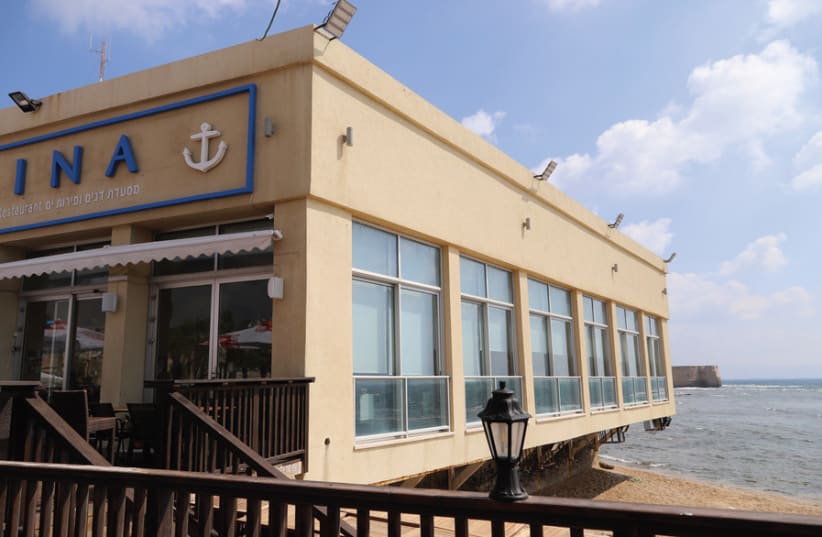Israel’s Health Ministry late Wednesday evening issued an urgent decree banning the sale of all seafood fished in the Mediterranean Sea, as the country continues to assess the damages of last week’s massive oil spill.
According to the government’s directive, no distribution or marketing of any Mediterranean seafood is allowed “until further notice.”
The order initially failed to specify if produce imported from other countries in the region would be approved for consumption, and on Thursday health officials issued a clarification, saying the ban only applied to “marine animals fished in Israel’s Mediterranean shores.”
Last week, approximately 160 km of Israel’s 190 km coastline was covered in thick black tar, causing severe damage to local plant and wildlife. The cause of the unprecedented environmental disaster is believed to have been an oil spill from a yet unidentified tanker.
A ministry spokesperson told The Media Line that “while so far no evidence has shown any danger arising from fish consumption, out of an abundance of caution some samples have been sent to the Agriculture Ministry’s lab for analysis, to rule out any presence of toxic particles.”
The lab results are expected early next week.
“They’re forcing us into an economical disaster, on top of the environmental one,” Sami Ali of Israel’s Fishermen’s Union told The Media Line. “We still haven’t made it through the coronavirus crisis, because the government hasn’t given us any support, and now we’re facing a new lethal measure.”
“All they give us is sanctions and limitations, how exactly are we supposed to make a living?”
While the past year’s global pandemic has significantly hurt the fishing industry, not everyone in the business was affected by Wednesday’s decision.
“The majority of the fish sold in Israel today isn’t from Israeli shores,” Idi Israelovitch, owner of Idi, one of the nation’s most popular fish restaurants, told The Media Line. “Most of what is served these days is brought in from Europe, Africa, Sri Lanka and of course Egypt. I don’t know of any ban on imports from Egypt or Turkey.”
The confusion mentioned by Idi forced Jerusalem to clarify its stance, allowing the shipment of foreign seafood from neighboring shores.
“There was no contamination in Egypt’s sea, and in Turkey, it’s mostly fish farms so that’s not affected by the spill anyway. We had a delivery arrive last night,” he said. “The ban is essentially on fishing, which doesn’t happen all that much. So it’s not going to harm us too much.”
David, owner of David’s Fish, one of the largest distributors in the Jerusalem area, believes the damage has already been done, regardless.
“It hasn’t done us any good. It causes panic among people that don’t differentiate. They hear a ban on fish, they’re not going to start inquiring where it’s from,” he told The Media Line.
“I have people calling me all day, telling me they’re throwing out what I sold them. Any little thing causes a scare that can kill a small business.”
David believes the whole thing will “blow over in a couple of weeks. But why does the Health Ministry first issue an explosive statement and then starts thinking about the repercussions?”
Others in the industry have complaints for the government as well.
“We’ve suffered for months,” Idi insists, referring to the three consecutive nationwide closures imposed in Israel over the past year, which has led to nearly a hundred thousand businesses being shuttered for good.
“The government promised support cheques and grants, but most of us haven’t received anything.”
“We’re a restaurant, I’m used to hosting, to having guests, people, real plates. Not aluminum and carton takeaway boxes. But you do what you can to survive. I’ve been luckier than others.”
A week after the toxic refuse first hit its shores, Israel is still reeling from the massive tar contamination, the result of hundreds of tons of leaked oil.
Hundreds of sea turtles, crabs, fish, whales and seagulls are thought to have perished in the spill, the culprit of which is still being searched for by local and international authorities.
Parliament’s Internal Affairs and Environment Committee will convene on Tuesday for an emergency session to discuss “the necessary steps needed to cope with the disaster.” The committee was barred from meeting until now because of the Likud party’s objection, which was lifted on Thursday.
During election cycles, when Israel’s parliament is not in session, committees can only be convened with the approval of all parties.
Despite the thousands of volunteers combing the coastline for the past week, recovery efforts are expected to last several months, by which time the government hopes to provide at least some answers as to the events leading up to the unprecedented catastrophe.
